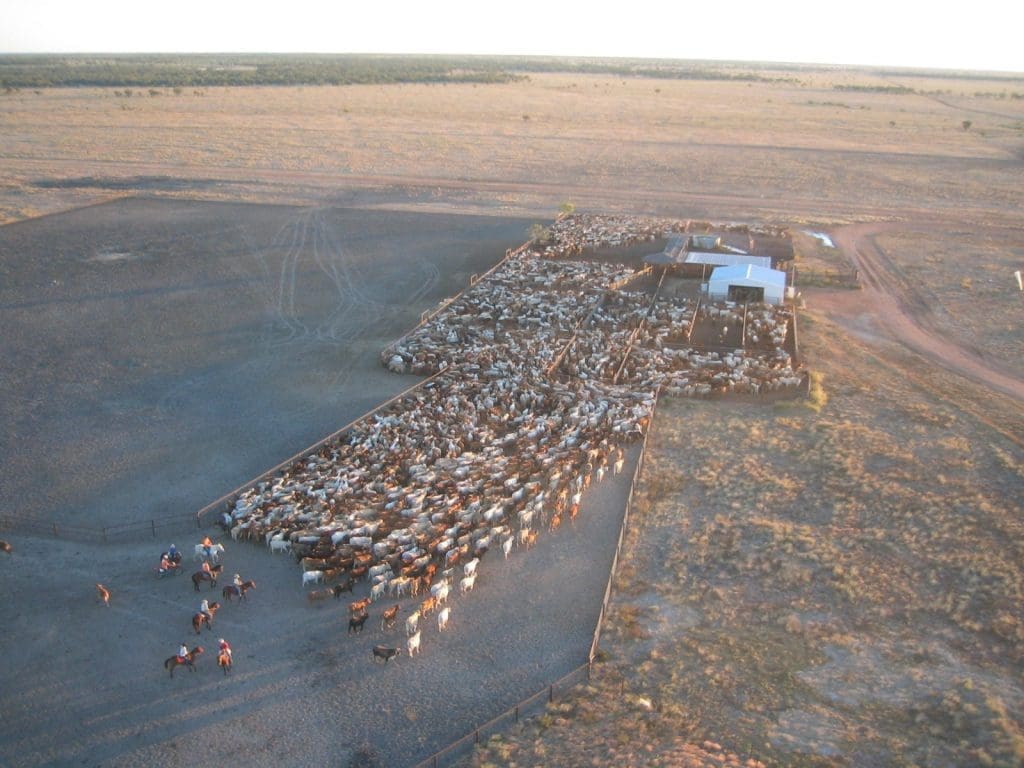
Cattle mustering on AA Co’s Canobie Station in the Gulf. Canobie is one of four company properties affected by last month’s record floods across the region
THE Australian Agricultural Co has lost an estimated 45,000 branded cattle on it northwest Queensland grazing properties following last month’s floods, the company told the ASX this morning.
The stock loss figure, accrued across AA Co’s Wondoola, Canobie, Dalgonally and Carrum stations along the Flinders and Saxby Rivers, does not include unbranded calves, which will not be assessed until first round mustering starts in coming months.
The company issued a preliminary assessment of stock losses and infrastructure damage on February 11, warning that ‘extreme’ losses were anticipated on the company’s Wondoola station, carrying around 33,000 head prior to the flood, and ‘lower, but still material losses’ on Canobie, Dalgonally and Carrum. At the height of the flood, satellite images showed Wondoola to be virtually entirely under water. AA Co said at the time that accurate assessments of the flood impact would take some time.
Survival rates on Wondoola have been estimated at only 10-20 percent (see property breakdown table below).
In this morning’s ASX advice, AA Co said flood levels in the gulf had now largely receded and the company had been able to undertake on-the-ground assessments of the impact to livestock and infrastructure.
Overall livestock losses were less than initial expectations in some cases, and the company had completed an updated evaluation of cattle numbers found to have survived.
“As anticipated, the scale of the flooding event has seen cattle distributed over great distances outside of defined property boundaries. It is estimated that tens of thousands of kilometres of boundary fences across the Gulf region have been destroyed and it will be some months before these are fully repaired,” AA Co said.
A more thorough assessment of cattle numbers would occur as mustering on AA Co and neighbouring properties is undertaken over coming months.
“Additional surviving cattle are likely to be identified as a result of that process, which will see cattle transferred both on and off AA Co properties,” the statement said.
This morning’s update provided estimated minimum survival rates, for the four individual Gulf properties most heavily impacted by the flooding event, based on current calculations of cattle that have been identified and assessed to date:

Note: total head numbers do not include new calves at foot with new brandings not typically calculated until first muster (April-May)
The impact on AA Co’s current herd would not affect the company’s ability to fulfil supply obligations or the rollout of its branded beef strategy, with all animals intended for the Company’s premium branded beef supply chain already on feed, this morning’s statement said.
While a full assessment of the impact on infrastructure across the 800,000ha of affected properties is yet to be completed, a preliminary estimate of the cost of repairing damage to property, plant, fencing, station and water infrastructure is in the range of $6-8 million.
This morning’s announcement also and highlighted the continued impact of the widespread drought conditions occurring across Australia.
Managing director and chief executive officer Hugh Killen said the update provided further clarification within the scope of the preliminary estimates made in February.
“On-the-ground assessments remain ongoing and it will be some time before we have a complete evaluation of the full impact of the flooding event,” he said.
“The speed, scale and extent of this natural disaster was unprecedented in the region and the impact on the local community and industry in the Gulf cannot be underestimated. While the cattle losses sustained by AA Co, as all other pastoralists in the impacted area, were tragic, we are now turning our full attention to recovery and ensuring a long-term, resilient and sustainable future for the beef industry in the Gulf.”
At the same time, as the company has previously flagged, ongoing extreme seasonal conditions in south-western Queensland and the Barkly in the Northern Territory would significantly increase station operating expenses, particularly grain, feeding and transport costs.
“The dry conditions and extreme heat have significantly impacted the Company’s cost of production, and operating expenses will continue to increase with further deterioration in the season,” Mr Killen said.
As stated in AA Co’s half-year results announced in November, this resulted in additional operational expenses for the first half of the 2019 financial year of $28.5 million compared with the previous corresponding period, and the second half is expected to be substantially in line with that trend.
“AA Co remains fully committed to its current strategy and continues to benefit from a robust balance sheet with our overall financial position remaining strong,” the ASX was told this morning.
A further update will be provided as part of the company’s upcoming full-year results in May.
- AA Co is holding a Surplus Steer Sale numbering 6000 head, at Longreach Saleyards on 22 March, interfaced on AuctionsPlus. Click here for more details
